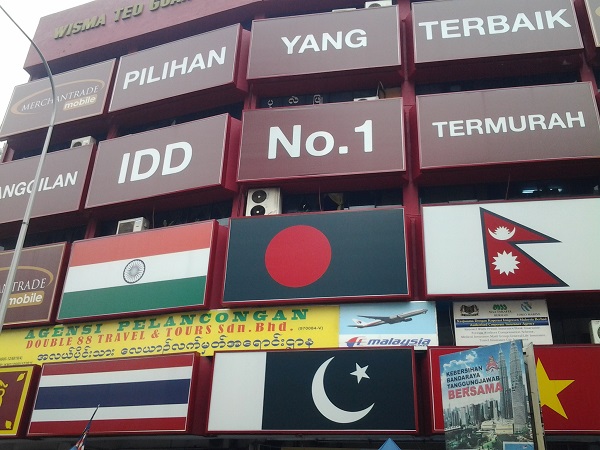Celcom takes 20% stake in MVNO Merchantrade
By Karamjit Singh September 5, 2013
- Move seen as smart diversification strategy in the migrant market
- Bundling of remittance and call minutes will help differentiate Merchantrade
 IN a move that one telco consultant calls a “very smart diversification strategy,” Celcom Axiata Bhd is believed to have taken a 20% stake in Merchantrade Asia Sdn Bhd (pic), a leading remittance provider and since 2008, a Mobile Virtual Network Operator (MVNO) with around 500,000 active subscribers at present.
IN a move that one telco consultant calls a “very smart diversification strategy,” Celcom Axiata Bhd is believed to have taken a 20% stake in Merchantrade Asia Sdn Bhd (pic), a leading remittance provider and since 2008, a Mobile Virtual Network Operator (MVNO) with around 500,000 active subscribers at present.
Celcom is said to have paid in the region of between US$6.09 million and US$7.6 million (RM20 million and RM25 million), which actually values Merchantrade lower than what Sumitomo Corp did when it took a 15% stake for RM30 million in early 2009.
However Celcom, as a network provider with comprehensive coverage in Malaysia, brings a lot more value to the table than Sumitomo did.
The deal is a win-win for all three parties. For Sumitomo, the value of its passive investment (it has only one executive in the Merchantrade management team, with two members flying in for quarterly board meetings) will likely go up with eventual higher earnings from Merchantrade.
For Merchantrade, it can now offer much more competitive rates to migrants calling home, while bundling its call rates with its remittance services to create a more compelling value package for migrant workers.
With increased competition in the remittance market, players need to offer value-add services to increase their stickiness with customers. For its remittance business, Merchantrade offers over-the-counter money transfer services, online money transfer (under the brand name ‘e-remit’) and mobile money transfer (under the brand name ‘Doowit’).
The World Bank estimates that in 2012, migrants sent an estimated US$401 billion in remittances to developing countries, a number that is expected to reach US$515 billion by 2015. Over half of the remittances sent to developing countries in 2012 flowed to Asia.
Already competitors note that Merchantrade offers the lowest IDD call rates to a number of foreign countries – in fact, even lower than what Celcom offers its own customers. This is possible as Celcom is likely charging Merchantrade very preferential wholesale rates.
With this move, Merchantrade can now look to increasing its revenue from the mobile business and not rely on the remittance business – which provides the bulk of its revenue at over 60%, says an executive familiar with its business.
Little wonder that this deal is something Ravi Vamathevan, the cofounder of Merchantrade, has been aiming for since last year, according to one telco executive who has dealt with him.
For Celcom, this allows it to expand its market reach into the migrant market via various brands – from its own suite of SIM packs for the migrant and ethnic groups, to Tune Talk, of which it has a stake 35% … and now Merchantrade.
“While there is the inevitable cannibalisation, ultimately, the wholesale revenue is still captured by Celcom,” one consultant said.
More importantly, the stake in Merchantrade also allows Celcom to eat into its competitors’ market share while acting as a defensive move to new entrants targeting the migrant market.
An executive with a competing telco acknowledges that this is a good move by Celcom to capture a piece of the market where it has been traditionally weak in.
“Its prepaid X-Pax brand has never really appealed to the migrant market. This is the only way for it to enter this market,” said the executive.
In fact, via its stake in Merchantrade, Celcom is even capturing the migrant market at source. Digital News Asia (DNA) understands that, at least for the Bangladesh market, where Merchantrade is especially strong in, it is offering migrant workers coming to Malaysia assimilation courses at its own expense.
The workers however are given a welcome pack after their training which includes a Merchantrade SIM pack and remittance account.
It is interesting to note that Merchantrade has a network of overseas offices in South Asia and South-East Asia that overlaps with some of the markets Axiata is in.
Whether it repeats this same strategy in those markets remains to be seen, but certainly this move by Celcom turns it into a very strong player in the migrant market.
It will need to be as the competition for the migrant market just went up a few notches. The latest to enter is a unit of Indonesia’s Telkomsel Group, Telin Malaysia, which quietly launched its MVNO service on Aug 25 with Maxis Bhd as its network partner.
Telkomsel is Indonesia’s largest mobile operator. In fact, Telkom chief executive officer Arief Yahya came for the launch. Telkom is Telkomsel’s main shareholder along with SingTel.
Incidentally, Merchantrade had actually gone to Maxis first with its intention to capture the migrant worker market as an MVNO in 2007, but Maxis decided to go it alone. Even Tune Talk approached Maxis first also in 2007 before it went to Celcom.
While Celcom has been the catalyst for the MVNO market in Malaysia, in the hyper- price sensitive migrant market, its bet on Merchantrade’s bundled offerings with remittance is an interesting move to break into the market.
For more technology news and the latest updates, follow @dnewsasia on Twitter or Like us on Facebook.


